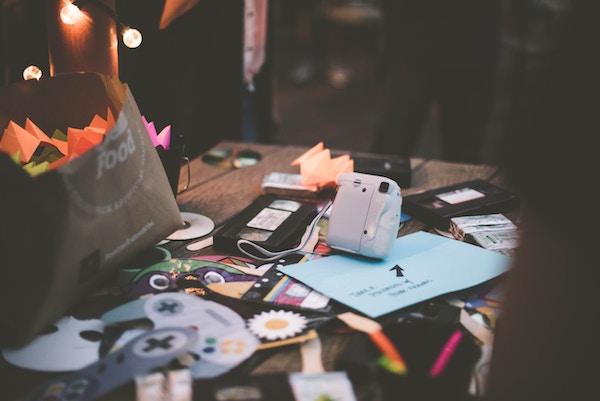
I’m perched at my dining room table.
At least, I think it’s my dining room table—it’s covered with a jumble of papers, books, the eight dyed Easter eggs (and a handful of stiff tissues dipped in the Easter dye, courtesy of my creative daughter), my son’s weekly spelling list, the kids’ breakfast plates, my husband’s mouse (for his computer, not the rodent kind, although we have those too), and the light therapy lamp I use to keep me semi-sane throughout our Maine winter.
In the past 10 years, I’ve managed to achieve many of my personal and professional goals. I’ve become a mom to two amazing kids, spun my passion for writing into a full-time job, and developed consistent yoga, exercise, and meditation practices.
But no matter what I try, from attending 12-step groups to binge-listening to podcasts on minimalism, I can’t seem to stay on top of my clutter. I wish I could say that the clutter is contained to the table, but it’s not. There’s also the kitchen clutter, the mudroom clutter, the toy clutter, and of course the laundry, which seems to be on a slow migration route, floating from room to room like a dry land version of the Pacific garbage patch.
I’m embarrassed about the state of my home, but I also know I’m not alone. Research has showed that at least 25 percent of Americans struggle with cluttered homes.
Why is clutter clogging up so many of our lives? For me, it comes down to a combination of the following reasons:
It’s serving us. Like excess weight that we cling to in a subconscious attempt to feel safe, for some of us who chronically struggle with clutter, it’s likely that clutter is serving us in some way. Perhaps the chaos creates an excuse that enables us to stay isolated from others, or it prevents us from staring down the twin fears of success and failure we must face when we scale our life goals. Maybe it makes us feel subconsciously blanketed, an ever-present project that distracts us from dealing with past trauma.
It pads us from our own mortality. Having a buffer of clutter is one way of subliminally asserting our wished-for permanence. If we have a home filled with memory-soaked items, we feel tethered and grounded. Since most of us deal with at least a low-thrum anxiety about our own inevitable death, refusing to release our belongings can keep that angst at bay.
We’re afraid of forgetting. The better part of my office is filled with sentimental items—which is why I’m instead working from the paper-strewn dining room table. While I’ve made a tiny bit of headway in sorting through those items, I always end up holding onto most of them, because they’re linked to memories. If I let go of the birthday cards, the photographs, and the old journals, it feels like letting go of slivers of my life—the belongings are the weight that keep those memories from floating away forever.
We’re afraid we will need our stuff again. We paid for that corkscrew, we reason, so why should we get rid of it? What if we need it again, despite the fact that we haven’t used it in over five years? We believe that because we traded money for the item, getting rid of it would be wasteful. (The Minimalists, a duo who pursue and speak about a minimalist lifestyle, developed a great rule related to our fear of letting go of “just in case” items—if we can replace the item for under $20 and in under 20 minutes, let it go.)
We have kids. I’ve been somewhat successful at streamlining many of my own belongings, but with school-aged kids, it’s a daily fight against a rising tide of stuff. Each day, their backpacks brim with schoolwork, much of it marked by their adorable uniqueness: my son’s speech on why kids shouldn’t have homework, my daughter’s rainbow and heart-filled artwork. And then there are the plastic party favors from friends’ birthday parties, the art projects, the holiday and birthday gifts.
We have an underlying condition. From depression to ADHD, there are some brain-based challenges that can keep us from getting organized. It took me decades to realize that my inability to master organization was related to ADHD, which brings a host of brain differences to those of us who have it, from the gifts like creativity, to struggles with prioritization and organization.
We’re too busy. For many of us, our clutter is a physical symptom of our duty-stuffed lives. We work, we parent, we exercise, we volunteer, we respond to emails and texts and social media, and we fall into our beds every night exhausted, knowing that the next day will bring more of the same. Some of us shop (or eat, or drink, or zone out on TV or the Internet) to deal with the stress of our overflowing lives.
I wish I could tell you I had the answers on how to plow through these obstacles and emerge grinning and clutter-free. But I’m right there in the messy middle of it, getting sick of the state of my home, making headway by evicting loads of unused items to Goodwill, only to fall back into the sea of clutter again.
If we take the time, though, to look at the myriad of blockades that are keeping us cluttered, I can’t help but have hope that by addressing these obstacles, we’ll get better.
~
Relephant:
5 Decluttering Tips—Clearing out the Excess in your Home & Life.
Clear Clutter & Change Your Life.
~
Author: Lynn Shattuck
Image: Samantha Gades/Unsplash; ClickFlashPhotos/Flickr
Editor: Catherine Monkman
Copy & Social Editor: Sara Kärpänen








Read 3 comments and reply